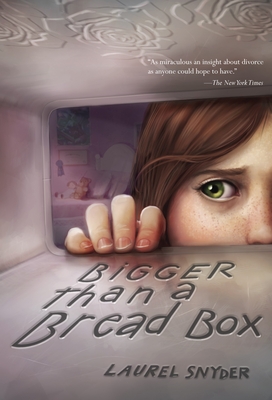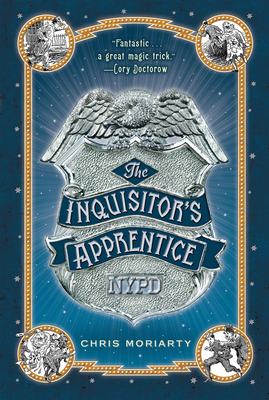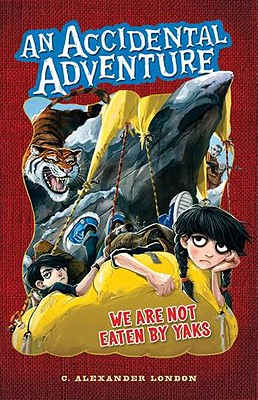Erin Bow is a much faster runner than I am, so I was pretty easily caught and tagged it. I had not heard of this “Next Big Thing” thing, but among my favorite pastimes is to talk about the writers and books that I love, and since this appears to be basically the point of the game–one person talks about his/her next project, then tags a few others in hopes that they’ll talk about theirs–I am so totally in. First of all, I am a big fan of Erin and Plain Kate, and I’m thoroughly intrigued by her description of her next book, Sorrow’s Knot (you can read about it in her post here). But the three authors I’d like to hear from are Laurel Snyder, Chris Moriarty, and C. Alexander London.
 Laurel Snyder is the author of books for young readers of all ages, but I knew of her from her middle grade novels Penny Dreadful and Bigger than a Bread Box. We subsequently discovered a mutual love of poetry, bourbon, and Edward Eager, as well as the fact that when she and I are both in Baltimore, we can theoretically walk from my sister’s house to her where her folks live. Most importantly, I love her writing. I love it on a sentence level and an emotional level, and I love her storytelling.
Laurel Snyder is the author of books for young readers of all ages, but I knew of her from her middle grade novels Penny Dreadful and Bigger than a Bread Box. We subsequently discovered a mutual love of poetry, bourbon, and Edward Eager, as well as the fact that when she and I are both in Baltimore, we can theoretically walk from my sister’s house to her where her folks live. Most importantly, I love her writing. I love it on a sentence level and an emotional level, and I love her storytelling.
 I was first introduced to Chris Moriarty‘s books by my husband Nathan, who got so annoyed that I wasn’t getting around to reading her adult sci-fi novels Spin State and Spin Control in a timely manner that he proceeded to read them aloud to me during a driving trip to visit his parents in Missouri. (It is, therefore, Nathan’s fault that Cohen, the A.I. who’s a major character in the Spin novels, is high on my list of fictional crushes.) Chris’s first fantasy for young readers, The Inquisitor’s Apprentice, came out last year and is fabulous. It’s set in a re-imagined turn-of-the19th/20th-century New York in which magic is regulated by the NYPD Inquisitor’s Office. I’m hoping I can pester her to tell us a little about the sequel, which comes out next spring.
I was first introduced to Chris Moriarty‘s books by my husband Nathan, who got so annoyed that I wasn’t getting around to reading her adult sci-fi novels Spin State and Spin Control in a timely manner that he proceeded to read them aloud to me during a driving trip to visit his parents in Missouri. (It is, therefore, Nathan’s fault that Cohen, the A.I. who’s a major character in the Spin novels, is high on my list of fictional crushes.) Chris’s first fantasy for young readers, The Inquisitor’s Apprentice, came out last year and is fabulous. It’s set in a re-imagined turn-of-the19th/20th-century New York in which magic is regulated by the NYPD Inquisitor’s Office. I’m hoping I can pester her to tell us a little about the sequel, which comes out next spring.
 Lastly (but only because I went in reverse-alphabetical order), I call upon C. Alexander London, author of the Accidental Adventures. I heard Sandy talking about the inspiration for these books at the Baltimore Book Festival earlier this year, and it went something like this (cribbing a bit from his blog): he was a journalist traveling overseas, and happened to be in Rangoon during a period of protests during which the government shut everything down, and although he was sort of smack in the middle of his own adventure, at the time all he wanted was to be home and watching T.V. And so was born the idea for a brother and sister who keep having these inconvenient adventures when really they just want to veg out on the couch. He is also from Baltimore, although we have not yet established how many backyards separate his childhood home from my grandparents’ house.
Lastly (but only because I went in reverse-alphabetical order), I call upon C. Alexander London, author of the Accidental Adventures. I heard Sandy talking about the inspiration for these books at the Baltimore Book Festival earlier this year, and it went something like this (cribbing a bit from his blog): he was a journalist traveling overseas, and happened to be in Rangoon during a period of protests during which the government shut everything down, and although he was sort of smack in the middle of his own adventure, at the time all he wanted was to be home and watching T.V. And so was born the idea for a brother and sister who keep having these inconvenient adventures when really they just want to veg out on the couch. He is also from Baltimore, although we have not yet established how many backyards separate his childhood home from my grandparents’ house.
Oh, yeah, and I’m supposed to talk about my next book, too, right?
Working title:
Greenglass House. I’ll admit I’m up in the air about the title, and I’m looking forward to discussing it with my editor. We shall see. It comes out in Spring of 2014, so we have time to figure that out one way or another.
Synopsis:
Milo’s parents run a ramshackle inn in the city of Nagspeake, an inn that mostly caters to smugglers. Since the frozen river means it’s a slow season for running contraband, usually Christmastime is quiet, so when guests suddenly start arriving on the first day of winter vacation Milo is both annoyed and confused, especially since none of them seem like the inn’s usual clientele. And, of course, they all seem to be keeping secrets.
Where did the idea come from?
Last summer a few members of my critique group decided to try a project where each of us put a short prompt into a hat. We all drew, and I got Lindsay Eland‘s prompt, which was stained glass. I began with the idea of a big old house with a collection of stained glass windows and decided to set it in my beloved city of Nagspeake, in the district called the Quayside Harbors. Once I knew that’s where the house was, I knew there would be smuggling involved somehow. That part of Nagspeake is just crawling with smugglers.
What genre is the book?
It’s a sort of puzzle-mystery with a folklorey, hinting-at-the-fantastic gooey caramel center.
Which actors would you choose to play your characters in a movie?
Oh, good grief, I have no idea. I never picture them that way. I’m way more likely to imagine about who might illustrate the book, if I’m lucky enough to have illustrations for it, but I still have too much work to do on the manuscript to daydream about that yet.
Will your book be self-published or represented by an agency?
It was sold by my agent at Scovil Galen Ghosh via proposal earlier this year to Lynne Polvino at Clarion Books, who also edited The Boneshaker and The Broken Lands.
How long did it take you to write the first draft?
Well, I wrote the first fifty or so pages in about a month. It sold to Clarion in May, but I had to spend the summer finishing up the publication of The Kairos Mechanism and preparing for the launch of The Broken Lands, so I wasn’t able to go back to Greenglass House until mid-September. I turned in the completed initial draft to Lynne in mid-November. I expect to have a lot of work to do in revisions, though. It’s short, but it’s a very intricate story.
To what other books would you compare it?
Well, I was inspired very much by The Westing Game, Evil Under the Sun, and Dungeons and Dragons. I don’t know whether it’s going to be like any of those things for anyone but me, though. I guess we’ll see.
What inspired you to write it?
Lindsay’s stained glass prompt, mostly. It turned out to be tied into the world of The Boneshaker and very intimately linked to my other upcoming book, The Left-Handed Fate (Holt, Fall 2014), but I didn’t know either of those things until this fall when I came back to it having done a lot of work on The Broken Lands in the meantime as well as having written The Kairos Mechanism and revised the heck out of the proposal for The Left-Handed Fate. I think if I had had to sit down and finish it before all those other things, this could’ve turned out to be a very different book. In the end, though, it owes its entire existence to Lindsay Eland and the words stained glass.
What else about the book might pique a reader’s interest?
I think I’m going to follow Erin Bow’s lead and let you read a bit. Here’s the opening page.
There is a right way to do things and a wrong way, if you are going to run a hotel in a smugglers’ town.
You shouldn’t make it a habit to ask too many questions, for one thing. And you probably shouldn’t be in it for the money. Smugglers are always going to be flush with cash tomorrow or next week when they find a buyer for the eight cartons of fountain pen cartridges that write in illegal shades of green, but they never have money today. You should, if you are going to run a smugglers’ hotel, get a big account book and assume whatever you write in it, the reality is, you’re going to get paid in fountain pen cartridges. Which (if you’re lucky—you could just as easily get paid with something even more useless) at least means you’ll have ink so you can keep track of all the money you aren’t ever going to see.
Milo Pine did not run a smugglers’ hotel, but his parents did. It was an inn, actually; a huge, ramshackle mansion called Greenglass House that sat on the side of a hill overlooking an inlet of harbors, a little district built half on the shore and half on the piers that jutted out into the river Skidwrack like the teeth of a comb. It was a long climb up to the inn from the waterfront by foot, or an only slightly-shorter trip by the cable railway that led from the inn’s private dock up the steep slope of Whilforber Hill. And of course the inn wasn’t only for smugglers, but that’s who turned up most often, so that’s how Milo thought of it.
Milo had lived at Greenglass House ever since he’d been adopted by Nora and Ben Pine when he was a baby. It had always been home. And he was used to the bizarre personages who passed through the inn, some of them coming back every season like extended family that showed up to pinch your cheeks at holidays and then disappeared again. After twelve years, he was even getting pretty good at predicting who was going to show up when. Smugglers were like bugs or vegetables. They had their seasons. Which was why it was so weird when the huge old bell on the porch, the one that was connected to the winch that drove the railway, started ringing.